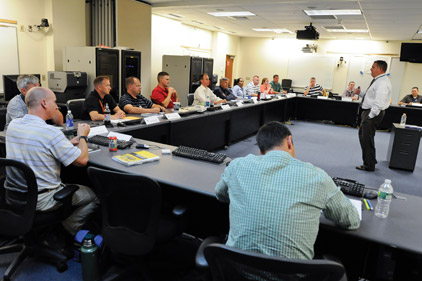 According to the U.S. Bureau of Labor Statistics (BLS), supply chain jobs are expected to grow 22 percent by the year 2022. Additionally, the BLS projects this increase to be double the rate of all other professions combined. One of the major reasons for this growth is because there is a strong need in modern business to acquire, allocate, distribute, and deliver products more efficiently in order to meet increasing customer expectations. Secondly, organizations are realizing that growing and maintaining net margins is becoming increasingly difficult through sales alone. The combination of these factors has placed supply chain operations on a much higher pedestal in today’s business environment. While there is no question that the next decade will place talented supply chain professionals in high demand, organizational leaders need to quickly start asking themselves one simple question, “Where do we find a supply of good talent?”
According to the U.S. Bureau of Labor Statistics (BLS), supply chain jobs are expected to grow 22 percent by the year 2022. Additionally, the BLS projects this increase to be double the rate of all other professions combined. One of the major reasons for this growth is because there is a strong need in modern business to acquire, allocate, distribute, and deliver products more efficiently in order to meet increasing customer expectations. Secondly, organizations are realizing that growing and maintaining net margins is becoming increasingly difficult through sales alone. The combination of these factors has placed supply chain operations on a much higher pedestal in today’s business environment. While there is no question that the next decade will place talented supply chain professionals in high demand, organizational leaders need to quickly start asking themselves one simple question, “Where do we find a supply of good talent?”
COLLEGE RECRUITING
Most organizations will turn to colleges and universities when they are in need of young talent with a specialized skillset. When finance, marketing, or information technology departments are looking to hire for new positions, it generally makes sense for them to hire people who have finance, marketing, or information technology degrees. Why should it be any different when hiring for your supply chain?
Fortunately, academia has caught on to the importance of supply chain management (SCM) disciplines, and new degree programs are emerging in business schools everywhere. It is becoming increasingly common to see curriculums that are generalized or specialized in the areas of SCM, operations, procurement, distribution, logistics, and transportation. In fact, the Council of Supply Chain Management Professionals (CSCMP) website currently has a college and university listing of 220 schools in the United States that offer programs focused on these disciplines. For more information, visit the CSCMP website at http://bit.ly/1jKHhjw.
Here are five steps to help you recruit students and establish your organization as an employer of choice.
1. Find a program that fits the needs of your organization.
First, it is important to understand that not all of the SCM and logistics programs are exactly the same. Some may have a stronger focus on warehousing and transportation, while others may specialize in procurement and inventory management. There are even a handful of schools that focus specifically on wholesale or industrial distribution. Research a few schools in your area to see which ones could help meet your current and future supply chain talent requirements.
2. Develop strong relationships with the faculty and staff.
Once you have chosen a school or two that fits your needs, it is essential to begin developing a relationship with the program faculty as soon as possible. Generally, they offer a wealth of information and will help you understand how their students can assist in solving your supply chain challenges. The faculty can also be great allies during the recruiting process because they can usually point you towards the best and brightest students.
3. Attend all career fairs and events.
Each semester, most schools will host career fairs and other events that are great ways to interact with students and faculty. Many supply chain programs will have some sort of student organization or club that organizes networking events, golf tournaments, facility tours, etc. It is important that you regularly attend each of these events with a well-marketed table or booth so that the students perceive you as a strong potential employer.
4. Hire interns for summer and part-time jobs.
One way that organizations can start integrating new supply chain talent is by providing summer internships and part-time work for students enrolled in these programs. This is a great way to inexpensively bring new people into your organization without making a full-time commitment. Internships work especially well in the HVACR industry when many organizations can always use some extra help during the busy
summer season.
5. Join the advisory board, if available.
Many university programs will bring together an advisory board that usually consists of employers who regularly recruit their students. This collaborative process gives the faculty some great insight on industry challenges, as well as feedback on the quality of their students and classes. Once you have established a strong relationship with the program, ask to be on its advisory board so that you can have an opportunity to influence the program content and curriculum towards your own supply chain needs.
INDUSTRY ASSOCIATIONS
Industry associations can be a great resource when organizations need to recruit some more experienced supply chain professionals. The following associations are focused on supply chain disciplines and can be great networks for finding top quality people.
• Heating, Air-conditioning, and Refrigeration Distributors International (HARDI);
• Council of Supply Chain Management Professionals(CSCMP);
• Warehousing Education & Research Council (WERC);
• American Society of Trans portation & Logistics (ASTL);
• Materials Handling Industry of North America (MHI);
• Institute for Supply Management (ISM);
• The Association for Operations Management (APICS).
Each association generally has chapters across the United States who will host networking and educational events in your area. Generally, these events are open for association members and non-members to attend. Once you get plugged into these networks, there will be a strong likelihood of finding potential supply chain leaders for your organization.
Another benefit of these associations is that they offer certification programs and other educational resources to sharpen the skillsets of your current employees. If hiring new people is not an option, they are a great resource help educate your organization’s supply
chain leaders.
WHAT’S AT STAKE
In the near future, it is very likely that many of the most valuable people in your organization — and on your payroll — will be the ones who can build and lead a modernized supply chain. As customer expectations increase, and business models are forced to change, organizational leaders will need to assess whether or not they currently have the right talent to keep up with the pace. Ultimately, the success and future sustainability of your organization will require some urgency on one important factor — getting the right people on the bus.
Publication date: 7/14/2014
Want more HVAC industry news and information? Join The NEWS on Facebook, Twitter, and LinkedIn today!








